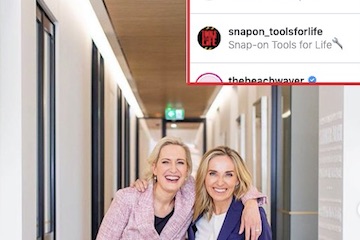Last month I addressed content ideas to maximize an Instagram feed to attract followers. In this post, I’ll discuss strategies to optimize Instagram posts to retain and engage an audience of potential buyers.
Selling on Instagram
Understand the algorithm. The goal of Instagram’s algorithm is to foster a positive user experience by showing relevant content. What users see is tied to the accounts they engage with, direct message to, and search for or tag.
It’s crucial for a brand — including ecommerce — to show up on Instagram consistently. Whether that’s via posts or Stories, new, consistent content keeps your image in follower’s feeds and enhances your standing in the hard-to-master algorithm.
There is no rule for the volume of content on Instagram. Larger companies may post daily or even multiple times per day. But that could be unrealistic for a small business with a small following.
Consistency is key. Neil Patel, the marketing guru, told Forbes, “If you make a habit of posting several times a day and then transition to only a few times a week, you will start to lose followers and generate less engagement per post.”
Scheduling posts. Once you’ve determined the frequency, optimize your posts by time of day. Later, a popular scheduling app, analyzed 12 million Instagram posts and found that the best time to post is between 9 a.m. and 11 a.m. Eastern Time.
But that could differ for your account. To find the best time, use (i) a scheduling app like Later for audience metrics, or (ii) Instagram’s Audience Insights (for business accounts) to see when most of your audience is online.
For example, according to Instagram Insights, the best time to post to my business account is Thursdays at 9 p.m. Eastern Time.
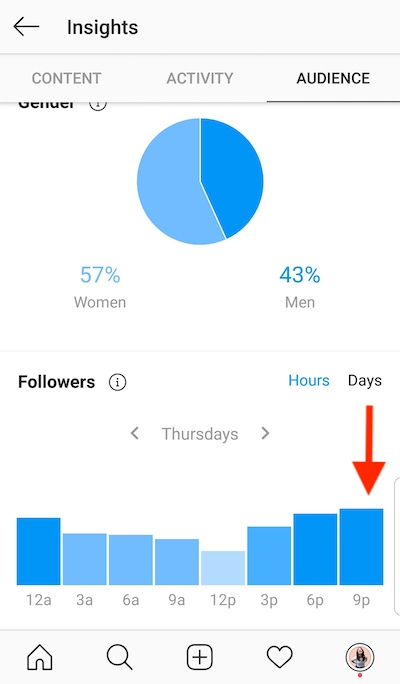
According to Instagram Insights, the best time to post to the author’s business account is Thursdays at 9 p.m. Eastern Time.
Optimize your company’s name. Names are a searchable field on Instagram, which makes it an optimal place to add keywords to your name and bio.
When I search for “tools” on Instagram, as an example, the results are tool-related accounts, from hair styling tools (“jacksbeautyline”) to hardware tools (“toolstoday”) to business tools (“toolstogrow”).
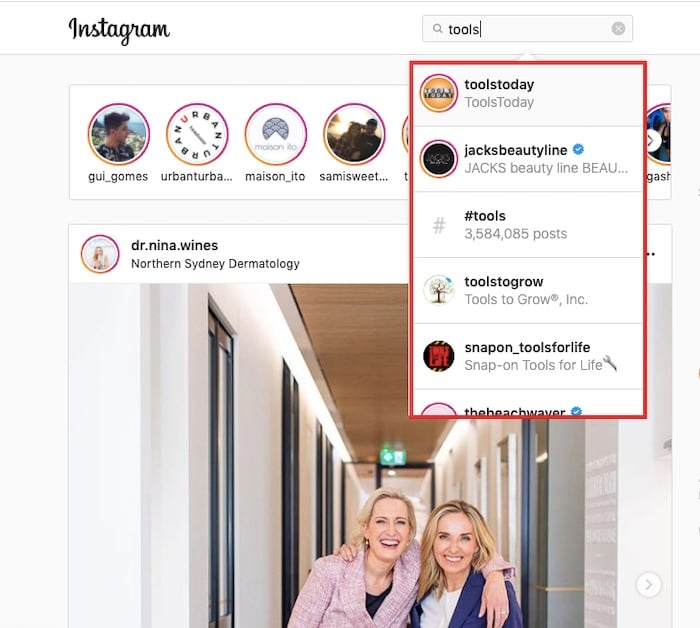
Searching for “tools” on Instagram produces tool-related results — hair styling tools (“jacksbeautyline”) to hardware tools (“toolstoday”) to business tools (“toolstogrow”).
“Tools” is not in the handle for the “thebeachwaver.” The profile, however, does include it: “Innovative Haircare + Tools.” Thus @thebeachwaverwhen can appear in “tools” results, too.
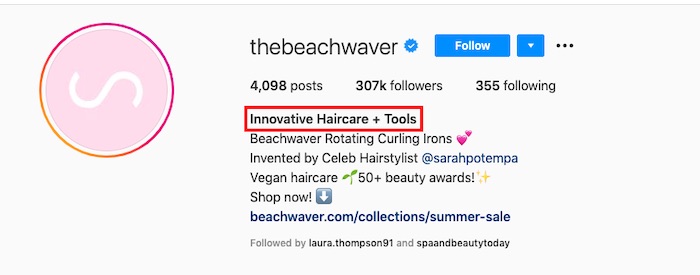
The handle @thebeachwaver does not include “tools.” But the profile does include it: “Innovative Haircare + Tools.”
Engagement. It’s not enough to optimize posts and send them into the abyss. You want followers to engage. Here’s how:
- Reply to all their comments promptly.
- Answer their questions publicly.
- Share their relevant content to your feed or Stories.
Hashtags. Think of hashtags as a search-optimization technique. Each post can include up to 30 hashtags, which is plenty for the most ecommerce businesses. Consider three types of hashtags:
- Geotags include a city or locale, such as “swimsuitsmiami.” Geotags are also helpful for brick-and-mortar stores to help consumers find directions, hours, and so on.
- Branded tags are specific to your product, name, or slogan, such as “beyourincredibleself.” All of your posts will appear when an Instagram user clicks that hashtag.
- Niche tags are hyper-focused with fewer searches, such as “deepseafishing” versus the broader “fishing.”
Try to place bulky tags, such as geotags and niche tags, in the first comment of your post, as in the example below from @dermavidualsny. Moreover, inserting a relevant hashtag (#corneotherapy) in the caption is a clever way to expand the reach.
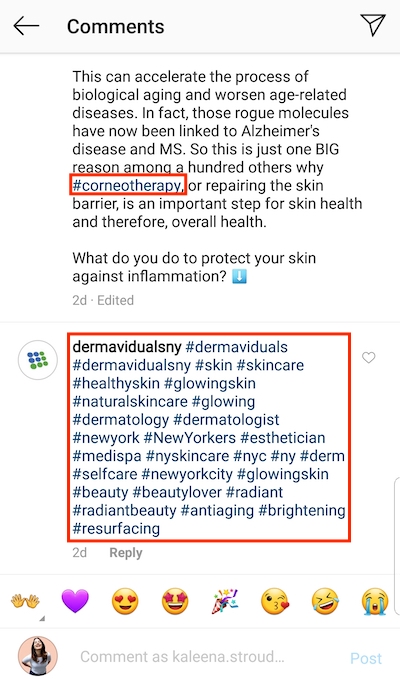
Place bulky tags in the first comment of a post. Insert a relevant hashtag, such as #corneotherapy, in the caption to expand the reach.
Find your voice. A ton of companies on Instagram compete for prospective customers. Stand out by having a unique tone and voice that your followers can count on. It creates loyalty and invites engagement. Instagram users are mostly younger and more informal than, say, users on Facebook, Twitter, and LinkedIn. A casual vibe is best.

